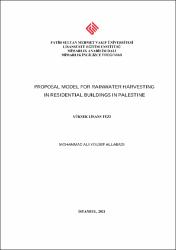Proposal Model for Rainwater Harvesting in Residential Buildings in Palestine
Künye
ALLABADI, Mohammad Ali Yousef, Proposal Model for Rainwater Harvesting in Residential Buildings in Palestine, Fatih Sultan Mehmet Vakıf Üniversitesi Lisansüstü Eğitim Enstitüsü Mimarlık Anabilim Dalı Mimarlık İngilizce Programı, Yayımlanmamış Yüksek Lisans Tezi, İstanbul 2021.Özet
Yaz ayları başta olmak üzere Filistin su kıtlığıyla karşı karşıyadır. Bu kıtlığın tek sebebi yağış rejiminin yetersiz olması değil, bölgedeki siyasal güç dengesizliğidir. İsrail’in bölgedeki su kaynaklarını kontrolü altında tutuşu, 30 yılı aşkın süredir iki ülke arasındaki krizlerin/müzakerelerin başlıca konusu olmuştur. Araştırma iki ülkenin arasındaki siyasal çatışmalardan uzak, bağımsız ve bireysel çözümlerle su krizini aşmanın yollarını incelemektedir.
Bu araştırma, su kıtlığı ve çözümlerini Antik Roma kentlerinden başlayarak, benzer nitelikteki coğrafyalarda arar. Ardından yine bölgedeki İslam dönemi eserlerini inceleyerek su yönetimi hakkında bilgi verir. Sonraki bölümde su yönetiminde yağmur hasadının önemi ve benzer krizler karşısında bu yöntem ile çözüm arayan örnek uygulamalar incelenmektedir. Ayrıca bu bölümde yağmur hasadının teknik uygulama prensiplerinden kapsamlı bir şekilde bahsedilecek, tek tek sistemin ögeleri açıklanmaktadır.Son kısımda, Filistin’in yıllık yağmur rejimine göre bilgiler içermekte, yine bu kentlerde bulunan yapı stoğunun yağmur hasadına uygunluğu sorgulanmaktadır. Bireysel olarak Filistin’de yaşayanların kurabilecekleri yağmur hasadı sistemleri hakkında bir model önerisi geliştirilmiştir. Water shortages in Palestine are regularly occurring year-round and more in the summer. The main causality is the Palestinian-Israeli conflict, control over natural resources is essential in controlling the region, and as for water being the source of life, it has been one of the main points in political discussions and negotiations, and it has been a crisis for the Palestinians for more than 3 decades. To avoid the complexity of the political aspect in searching for an applicable solution, the idea of a decentralized approach is preferable for an independent potable water provider.Steps of approaching this research will begin in discussing Palestine's water issues through previous civilizations in the same region, beginning with Roman ancient cities, following it with examples across various Islamic periods reaching to the current situation. Moving forward a description of Palestine's water sources and data regarding them, and the political aspects that revolved around them. The next step will be focussed on rainwater harvest. Starting with previous trials by countries that face a similar crisis, discussing the elements used, how they were used and their results. Moving on to the study of rainwater harvest systems, this section will thoroughly layout rainwater harvest systems elements and specifications in current times and technologies.Finally, a series of collecting data regarding rain and general statistics concerning buildings' types, areas floors and dwellings in Palestine will be utilized and analysed in the process of figuring out Palestinian governorates' ability in rainwater harvest.



















